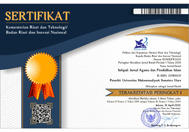Kreativitas Dalam Perspektif Teori Humanistik Rogers
Abstract
Rogers is one of humanism figure who views human as a tough and creative individual to develop him self. His educational background really influence the way he thought and his theory. His most famous theory was client centered. In the theory, a client is considered as a honored and possessed super power within his body. Therapist in this theory is seen like a real friend who is trying to position him and his client without distance nor boundaries. This is intended so that the client is willing to communicate his main problems freely. The goal is to discover his client potential talent owned. This theory will be effectively applied in educational field recently. Within this, students are expected to grow and develop according to their interest and talents, without any outside force. The expected outcome is that the students will become golden individual who have more humanity and creative as well.
Keywords
Full Text:
PDFReferences
Ali, M., & Asrori, M. (2004). Psikologi Remaja Perkembangan Peserta Didik. Jakarta: PT Bumi Aksara.
Aziz, R. (2010). Psikologi Pendidikan Model Pengembangan Kreativitas dalam Praktik Pembelajarain. Malang: UIN-Maliki Press.
Chotif, M. (2012). Sekolahnya Manusia Sekolah Berbasis Multiple Intelligences di Indonesia. Bandung: Kaifa.
Dalyono, M. (1997). Psikologi Pendidikan. Jakarta: PT Rineka Cipta.
Feist, J. F. (2010). Theories of Personality. Jakarta: Salemba Humanika.
Ghufron, M. N., & Risnawita, R. (2010). Teori-teori Psikologi. Yogyakarta: Ar-Ruzz Media.
Gibson, R. L., & Mitchell, M. H. (2011). Introduction to Counseling and Guidance. Yogyakarta: Pustaka Pelajar.
Irawan, E. N. (2008). Pemikiran Tokoh-Tokoh Psikologi dari Klasik sampai Modern: Biografi, Gagasan, dan Pengaruh terhadap Dunia. Jakarta: Grafindo.
Irawan, E. N. (2015). Pemikiran Tokoh-Tokoh Psikologi dari Klasik sampai Modern: Biografi, Gagasan, dan Pengaruh terhadap Dunia. Yogyakarta: IRCiSoD.
Jamaris, M. (2013). Orientasi Baru dalam Psikologi Pendidikan. Bogor: Ghalia Indonesia.
Langgulung, H. (1991). Kreativitas dan Pendidikan Islam Suatu Kajian Psikologi dan Falsafah. Jakarta: Pustaka Al-Husna.
LN, S. Y., & Nurihsan, A. J. (2011). Teori Kepribadian. Bandung: PT Remaja Rosdakarya.
Malik, I. (2011). Pengantar Psikologi Umum. Yogyakarta: Teras.
Munandar, S. U. (1999). Mengembangkan Bakat dan Kreativitas Anak Sekolah: Penuntun Bagi Guru dan Orang Tua. Jakarta: PT Grasindo.
Pervin, L. A. (2012). Personality: Theory and Research. Jakarta: Kencana.
Rachmawati, Y., & Kurniati, E. (2012). Strategi Pengembangan kreativitas Pada Anak Uisa Taman Kanak-Kanak. Jakarta: Prenada Media Group.
Schulz, D. P. (2015). A History of Modern Psychology . Bandung: Nusa Media.
Semiun, Y. (2010). Kesehatan Mental 1. Yogyakarta: Kanisius.
Sudjana, D. (2000). Pendidikan Luar Sekolah: Wawasan, Sejarah, Perkembangan, Falasafah, dan Teori Pendukung, Serta Asas. Bandung: Falah Production.
Thobroni, M., & Mustofa, A. (2013). Belajar dan Pembelajaran: Pengembangan Wacana dan Praktik Pembelajaran dalam Pembangunan Nasional. Yogyakarta: Ar-Ruzz Media.
DOI: https://doi.org/10.30596/intiqad.v14i1.10372
Refbacks
- There are currently no refbacks.
Intiqad Jurnal Agama dan Pendidikan Islam is abstracting & indexing in the following databases:
View My StatsEditorial Address:
Faculty of Islamic Religion, Universitas Muhammadiyah Sumatera Utara. Jl. Mukhtar Basri No. 3 Medan 20238 Telp. (061) 6622400 ext. 27 dan 28 Fax. (061) 6625474. e-mail: intiqad@umsu.ac.id

























